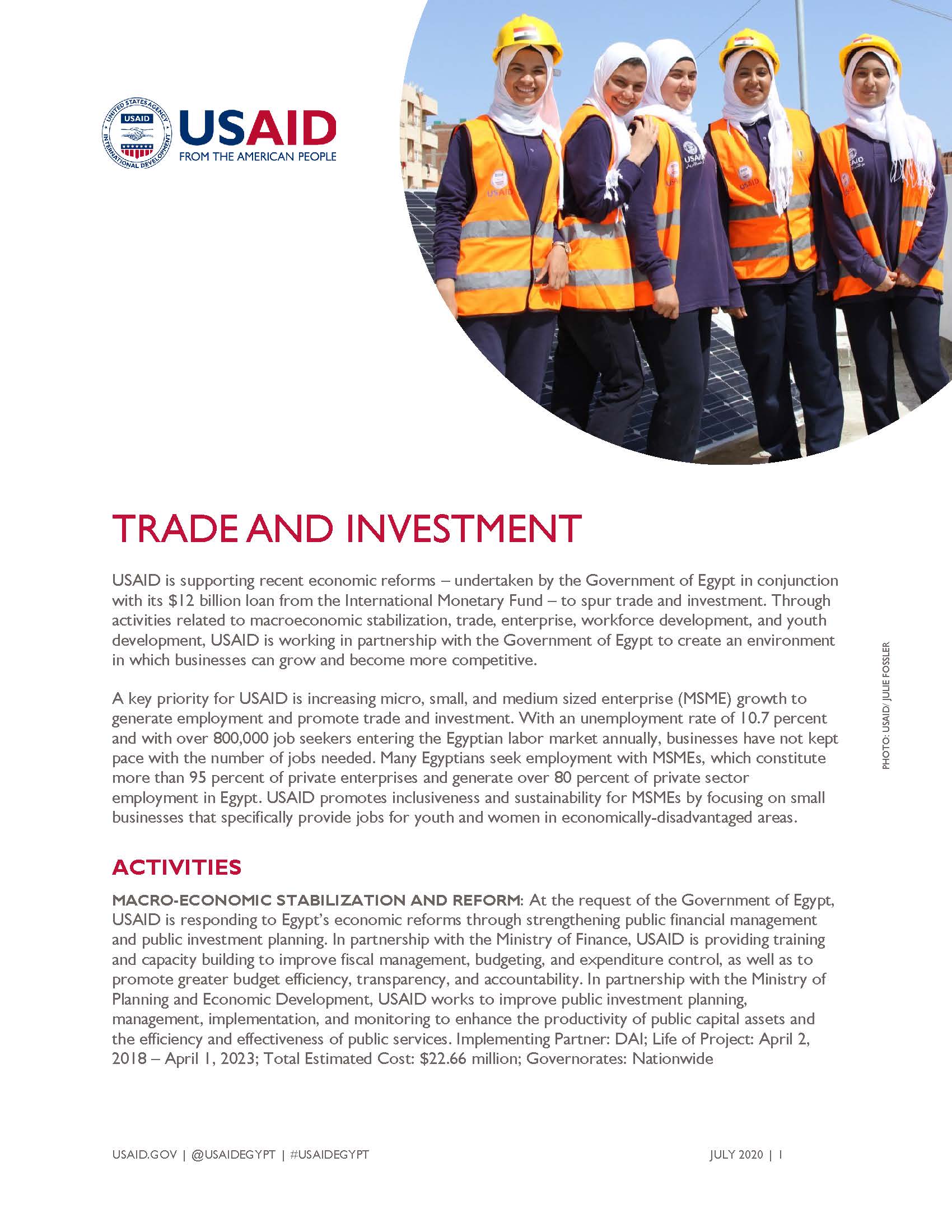Speeches Shim

Overview
USAID is supporting recent economic reforms – undertaken by the Government of Egypt in conjunction with its $12 billion loan from the International Monetary Fund -- to spur trade and investment. Through activities related to macroeconomic stabilization, trade, enterprise, workforce development, and youth development, USAID is working in partnership with the Government of Egypt to create an environment in which businesses can grow and become more competitive.
A key priority for USAID is increasing micro, small, and medium sized enterprise (MSME) growth to generate employment and promote trade and investment. With an unemployment rate of 10.7 percent and with over 800,000 job seekers entering the Egyptian labor market annually, businesses have not kept pace with the number of jobs needed. Many Egyptians seek employment with MSMEs, which constitute more than 95 percent of private enterprises and generate over 80 percent of private sector employment in Egypt. USAID promotes inclusiveness and sustainability for MSMEs by focusing on small businesses that specifically provide jobs for youth and women in economically-disadvantaged areas.
USAID/Egypt Fact Sheet: Trade and Investment ![]() (pdf - 249k)
(pdf - 249k)
Activities
MACRO-ECONOMIC STABILIZATION AND REFORM: At the request of the Government of Egypt, USAID is responding to Egypt’s economic reforms through strengthening public financial management and public investment planning. In partnership with the Ministry of Finance, USAID is providing training and capacity building to improve fiscal management, budgeting, and expenditure control, as well as to promote greater budget efficiency, transparency, and accountability. In partnership with the Ministry of Planning and Economic Development, USAID works to improve public investment planning, management, implementation, and monitoring to enhance the productivity of public capital assets and the efficiency and effectiveness of public services. Implementing Partner: DAI; Life of Project: April 2, 2018 – April 1, 2023; Total Estimated Cost: $22.66 million; Governorates: Nationwide
WORKFORCE IMPROVEMENT AND SKILLS ENHANCEMENT: USAID is collaborating with the Ministry of Education and Technical Education to improve technical secondary education to meet the needs of the job market, benefiting vocational school students and teachers as well as the private sector. The workforce activity establishes partnerships between businesses and technical schools in order to understand skills needed for employment and to link students with jobs. USAID partners with companies and business associations to improve the performance of the private sector through in-house training and improved human resource strategies that reduce staff turnover. USAID’s workforce activity also seeks to build the capacity of business associations to advocate for reforms related to labor market efficiency. Implementing Partner: MTC International Development Holding Co., LLC; Life of Project: November 2015-October 2020; Total Estimated Cost: $29.1 million; Governorates: Alexandria, Aswan, Beni Suef, Damietta, Fayoum, Gharbia, Ismailia, Menoufia, Port Said, Red Sea, Sharqia
STRENGTHENING ENTREPRENEURSHIP AND ENTERPRISE DEVELOPMENT: USAID supports the development of entrepreneurship among youth and promotes the growth and competitiveness of micro, small, and medium sized enterprises by improving access to high-quality public and private services. The activity focuses on select value chains, including ready-made garments, plastics, automotive accessories, dairy products, and fisheries. An emphasis is placed on businesses that are woman-owned or have the potential to hire significant numbers of women and youth. Implementing Partner: AECOM; Life of Activity: November 2015 – July 2020; Total Estimated Cost: $22.9 million; Governorates: Alexandria, Assiut, Cairo, Dakahlia, Gharbia, Giza, Menoufia, Minya, Port Said, Qalyoubia, Qena, Sohag
EGYPTIAN-AMERICAN ENTERPRISE FUND: The Egyptian-American Enterprise Fund (EAEF) is a U.S. Government-funded private entity with a dual mission. First, it aims to stimulate growth in the Egyptian private sector by providing small- and medium-sized enterprises access to investment capital and loans, modern technologies, and best business practices. Second, the EAEF targets investments that achieve long-term sustainable economic development. The fund has made around $220 million in investments in a business accelerator, financial inclusion companies, and a healthcare provider, among others. EAEF was established in 2013 and runs through 2028. The fund, now fully capitalized at $300 million, is led by a board of directors that is primarily composed of Egyptian-American and Egyptian nationals and advised by Lorax Capital Partners, a financial services institution led by an experienced Egyptian management team. To learn more, visit: https://www.eaefund.org/. Implementing Partner: Egyptian-American Enterprise Fund; Life of Project: 2013-2028; Total Estimated Cost: up to $300 million; Governorates: Nationwide
ENHANCING THE U.S.-EGYPT COMMERCIAL TRADE AND INVESTMENT RELATIONSHIP: USAID provides a four year, $2,975,000 grant to the U.S. Department of Commerce’s Commercial Law Development Program to provide legal and trade-related technical assistance to the Government of Egypt and the Egyptian private sector. The Government of Egypt requested this assistance in the context of talks on the U.S.-Egypt Trade and Investment Framework Agreement. Implementing Partner: U.S. Department of Commerce’s Commercial Law Development Program; Life of Project: September 2018 – September 2022; Total Estimated Cost: $2,975,000; Governorates: Nationwide



Comment
Make a general inquiry or suggest an improvement.